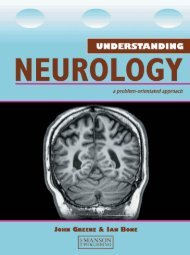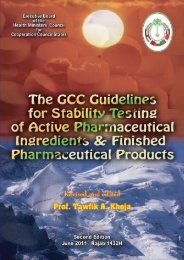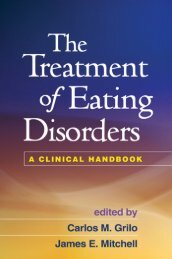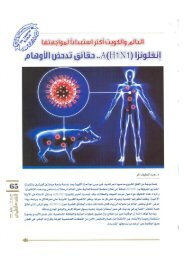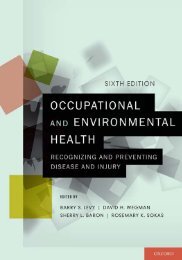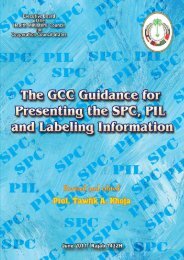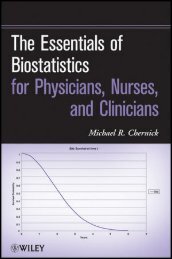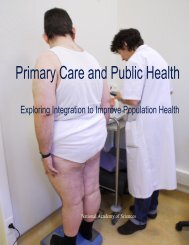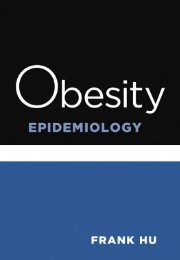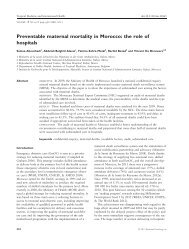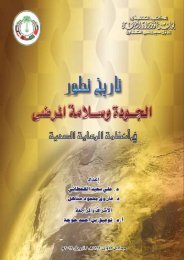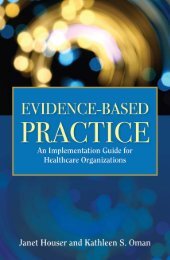- Page 3:
NMS Q&AFamily Medicine3rd EDITION
- Page 6 and 7:
Acquisitions Editor: Susan RhynerPr
- Page 9:
Foreword to the First EditionFamily
- Page 13:
AcknowledgmentsFor the contribution
- Page 16 and 17:
xivContentsChapter 15 Surgical Issu
- Page 19 and 20:
SECTION IUrgent Carechapter 1Urgent
- Page 21 and 22:
Urgent Care in Family Practice 3(A)
- Page 23 and 24:
Urgent Care in Family Practice 5Exa
- Page 25:
Urgent Care in Family Practice 7rem
- Page 28 and 29:
10 NMS Q&A Family Medicine(A) To pl
- Page 30 and 31:
12 NMS Q&A Family MedicineExaminati
- Page 33 and 34:
chapter 3Otolaryngology inPrimary C
- Page 35 and 36:
Otolaryngology in Primary Care 17tr
- Page 37 and 38:
Otolaryngology in Primary Care 1924
- Page 39 and 40:
Otolaryngology in Primary Care 21of
- Page 41:
Otolaryngology in Primary Care 23co
- Page 44 and 45:
26 NMS Q&A Family Medicine(A) Migra
- Page 46 and 47:
28 NMS Q&A Family MedicineExaminati
- Page 48 and 49:
30 NMS Q&A Family MedicineQuestions
- Page 50 and 51:
32 NMS Q&A Family Medicine(A) Distu
- Page 52 and 53:
34 NMS Q&A Family MedicineExaminati
- Page 54 and 55:
36 NMS Q&A Family Medicine80 mm Hg.
- Page 57 and 58:
SECTION IIICardiovascular Diseasesi
- Page 59 and 60:
Cardiology 41(A) Systolic crescendo
- Page 61 and 62:
Cardiology 43Examination Answers1.
- Page 63 and 64:
Cardiology 4516. The answer is C. T
- Page 65 and 66:
chapter 7Peripheral Vascular Diseas
- Page 67 and 68:
Peripheral Vascular Disease 49would
- Page 69 and 70:
Peripheral Vascular Disease 51Exami
- Page 71 and 72:
Peripheral Vascular Disease 53right
- Page 73 and 74:
chap ter 8Cerebrovascular DiseaseEx
- Page 75 and 76:
Cerebrovascular Disease 57(A) A non
- Page 77 and 78:
Cerebrovascular Disease 59ventricul
- Page 79 and 80:
chap ter 9Pediatric CardiologyExami
- Page 81 and 82: Pediatric Cardiology 6315 You hear
- Page 83 and 84: Pediatric Cardiology 65by placing o
- Page 85 and 86: chap ter 10HypertensionExamination
- Page 87 and 88: Hypertension 6915 In hypertensive p
- Page 89: Hypertension 71systolic hypertensio
- Page 92: 74 NMS Q&A Family Medicine(A) Right
- Page 95 and 96: Neurology 778. The answer is A. The
- Page 97 and 98: SECTION VRespiratory Diseasesin Pri
- Page 99 and 100: Pneumonia and Bronchitides 81(C) Co
- Page 101 and 102: Pneumonia and Bronchitides 836. The
- Page 103 and 104: chapter 13Respiratory Diseasesin Ch
- Page 105 and 106: Respiratory Diseases in Children 87
- Page 107 and 108: SECTION VIThe Gastrointestinal Trac
- Page 109 and 110: Medical Problems of the Gastrointes
- Page 111 and 112: Medical Problems of the Gastrointes
- Page 113 and 114: chap ter 15Surgical Issues of theGa
- Page 115 and 116: Surgical Issues of the Gastrointest
- Page 117 and 118: Surgical Issues of the Gastrointest
- Page 119 and 120: chap ter 16Problems of the LiverExa
- Page 121 and 122: Problems of the Liver 103level, whe
- Page 123 and 124: Problems of the Liver 105been inves
- Page 125 and 126: SECTION VIIUrology and Nephrologyin
- Page 127 and 128: Problems of the Urinary Tract 10913
- Page 129: Problems of the Urinary Tract 11110
- Page 134 and 135: 116 NMS Q&A Family MedicineExaminat
- Page 136 and 137: 118 NMS Q&A Family Medicineof malig
- Page 138 and 139: 120 NMS Q&A Family Medicine(D) Sulf
- Page 140 and 141: 122 NMS Q&A Family MedicineExaminat
- Page 142 and 143: 124 NMS Q&A Family MedicineReferenc
- Page 144 and 145: 126 NMS Q&A Family Medicinecycle. H
- Page 146 and 147: 128 NMS Q&A Family MedicineExaminat
- Page 149 and 150: chapter 21Gynecology in Mature Adul
- Page 151 and 152: Gynecology in Mature Adults 133amen
- Page 153 and 154: Gynecology in Mature Adults 1357. T
- Page 155 and 156: chapter 22Diseases of the Female Br
- Page 157 and 158: Diseases of the Female Breast 139Ex
- Page 159: Diseases of the Female Breast 141Re
- Page 162 and 163: 144 NMS Q&A Family Medicine(B) Long
- Page 164 and 165: 146 NMS Q&A Family Medicine(D) PIP
- Page 166 and 167: 148 NMS Q&A Family Medicine6. The a
- Page 169 and 170: chapter 24Musculoskeletal Problemso
- Page 171 and 172: Musculoskeletal Problems of the Nec
- Page 173 and 174: Musculoskeletal Problems of the Nec
- Page 175 and 176: chapter 25Musculoskeletal Problemso
- Page 177 and 178: Musculoskeletal Problems of the Low
- Page 179 and 180: Musculoskeletal Problems of the Low
- Page 181 and 182: chapter 26Rheumatology in Primary C
- Page 183 and 184:
Rheumatology in Primary Care 165(D)
- Page 185:
Rheumatology in Primary Care 16710.
- Page 188 and 189:
170 NMS Q&A Family Medicineof 5 ft,
- Page 190 and 191:
172 NMS Q&A Family Medicinepresent.
- Page 192 and 193:
174 NMS Q&A Family Medicinenodules.
- Page 194 and 195:
176 NMS Q&A Family MedicineExaminat
- Page 196 and 197:
178 NMS Q&A Family MedicineReferenc
- Page 198 and 199:
180 NMS Q&A Family Medicineperipher
- Page 200 and 201:
182 NMS Q&A Family Medicineconditio
- Page 202 and 203:
184 NMS Q&A Family Medicine(D) Pneu
- Page 204 and 205:
186 NMS Q&A Family MedicineExaminat
- Page 207 and 208:
chap ter 31Other Infectious Disease
- Page 209 and 210:
Other Infectious Diseases in Primar
- Page 211 and 212:
Other Infectious Diseases in Primar
- Page 213 and 214:
SECTION XIEndocrinology inPrimary C
- Page 215 and 216:
Diabetes Mellitus 197normal saline
- Page 217 and 218:
Diabetes Mellitus 199Examination An
- Page 219:
Diabetes Mellitus 20116. The answer
- Page 222 and 223:
204 NMS Q&A Family Medicine(A) Seru
- Page 224 and 225:
206 NMS Q&A Family MedicineExaminat
- Page 226 and 227:
208 NMS Q&A Family Medicine16. The
- Page 228 and 229:
210 NMS Q&A Family Medicine(E) Hypo
- Page 230 and 231:
212 NMS Q&A Family MedicineExaminat
- Page 232 and 233:
214 NMS Q&A Family Medicinelikeliho
- Page 234 and 235:
216 NMS Q&A Family Medicine(A) Prad
- Page 236 and 237:
218 NMS Q&A Family MedicineExaminat
- Page 239 and 240:
SECTION XIIAllergieschapter 36Atopi
- Page 241 and 242:
Atopic, Food, and Contact Allergies
- Page 243 and 244:
Atopic, Food, and Contact Allergies
- Page 245 and 246:
SECTION XIIIPreventive HealthCarech
- Page 247 and 248:
Preoperative Clearance 229180 to 22
- Page 249 and 250:
Preoperative Clearance 23121 Prophy
- Page 251 and 252:
Preoperative Clearance 233example,
- Page 253 and 254:
chap ter 38Obesity and Dyslipidemia
- Page 255 and 256:
Obesity and Dyslipidemia 23713 A 45
- Page 257 and 258:
Obesity and Dyslipidemia 239attriti
- Page 259 and 260:
chapter 39Smoking CessationExaminat
- Page 261 and 262:
Smoking Cessation 243Examination An
- Page 263 and 264:
chapter 40Exercise and HealthExamin
- Page 265 and 266:
Exercise and Health 247Examination
- Page 267 and 268:
chapter 41Concepts in Epidemiologya
- Page 269 and 270:
Concepts in Epidemiology and Resear
- Page 271:
Concepts in Epidemiology and Resear
- Page 274 and 275:
256 NMS Q&A Family Medicine7 What i
- Page 276 and 277:
258 NMS Q&A Family Medicineantigen
- Page 278 and 279:
260 NMS Q&A Family Medicine(B) Arra
- Page 280 and 281:
262 NMS Q&A Family Medicineinfectio
- Page 282 and 283:
264 NMS Q&A Family Medicine(D) Pulm
- Page 284 and 285:
266 NMS Q&A Family Medicinemay occu
- Page 286 and 287:
268 NMS Q&A Family Medicinebeing se
- Page 288 and 289:
270 NMS Q&A Family Medicineis exace
- Page 290 and 291:
272 NMS Q&A Family Medicine8 What a
- Page 292 and 293:
274 NMS Q&A Family Medicine12. Hepa
- Page 294 and 295:
276 NMS Q&A Family Medicine(D) Ever
- Page 296 and 297:
278 NMS Q&A Family MedicineAlthough
- Page 298 and 299:
280 NMS Q&A Family Medicine5 Of the
- Page 300 and 301:
282 NMS Q&A Family Medicineclinicia
- Page 302 and 303:
284 NMS Q&A Family Medicine9 Regard
- Page 304 and 305:
286 NMS Q&A Family MedicineExaminat
- Page 306 and 307:
288 NMS Q&A Family Medicinedenied a
- Page 308 and 309:
290 NMS Q&A Family Medicinewithout
- Page 310 and 311:
292 NMS Q&A Family MedicineExaminat
- Page 313 and 314:
chapter 51Anxiety and PhobiasExamin
- Page 315 and 316:
Anxiety and Phobias 297Examination
- Page 317 and 318:
chapter 52Somatic Symptoms withoutO
- Page 319 and 320:
Somatic Symptoms without Organic Ba
- Page 321:
Somatic Symptoms without Organic Ba
- Page 324 and 325:
306 NMS Q&A Family Medicine5 A 25-y
- Page 326 and 327:
308 NMS Q&A Family Medicineperiorbi
- Page 328 and 329:
310 NMS Q&A Family Medicineand loti
- Page 331 and 332:
chapter 54GeriatricsExamination que
- Page 333 and 334:
Geriatrics 315Examination Answers1.
- Page 335 and 336:
chapter 55HematologyExamination que
- Page 337 and 338:
Hematology 31915 A 45-year-old busy
- Page 339 and 340:
Hematology 321Mean cell hemoglobin
- Page 341:
Hematology 323whereas in multiple m
- Page 344 and 345:
326 NMS Q&A Family Medicine7 A 45-y
- Page 346 and 347:
328 NMS Q&A Family MedicineExaminat



